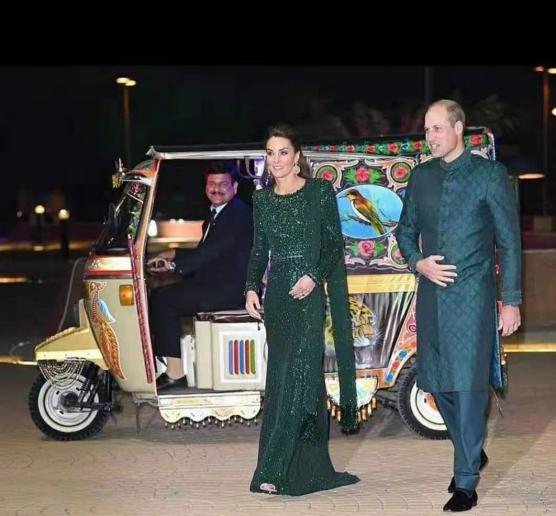Anmer Hall,
Kings Lynn and West Norfolk,
England, United Kingdom
Dear Uncle and Aunty,
Greetings,
This letter comes to you from your Pakistani nephew whom you do not know. I would like to thank you for visiting my motherland. For you it was, “Royal Tour”, but for Pakistan, your visit was “the most complex tour” due to security and logistical considerations. According to reports, over 1,000 security personals were used to ensure your safety and protection. I am optimistic, you must have enjoyed five-day trip that covered more than 1,000KM from Islamabad to Lahore, and countryside in the North, and border regions to the West.
Uncle, by God you both are matchless. You both were constantly in breaking-news in Pakistani media and gossips about the dressing sense of Aunty Kate were in prime-time headlines. Undoubtedly, aunty was looking gorgeous in green “Shalwar-Kameez”, a traditional style of dress for Pakistani women, which she dressed at “Emperor’s Mosque”. I am not sure either aunty was informed that her late mother-in-law also visited this Mosque during her trip?
Uncle, I would like to take an opportunity to tell you that one of my ancestors – Mughal Emperor, Aurangzeb built that Mosque in 1673 long-before “The British Raj” on the Indian subcontinent – “Golden Bird” from 1858 to 1947. You should know why my country, sliced away from India, came into being and gained independence. I do not want to talk about bitter history, dim present and shady future! But, I want to show you the other side of picture that you missed during your “Royal Tour”.
Believe me, uncle, at its creation, Pakistan inherited the British legacy of a parliamentary system. But, the parliaments (National or Provincials) are only debating and fighting club of elite. Sometimes, elections only commit to reshuffling of the same faces. However, presently Pakistan has a democratic system without democrats and it is hijacked by a small group of feudal lords, political elites, business groups and bureaucrats.
In 2019, Pakistan is facing terrible economic crisis, the economy has slowed down, the Rupee has been devalued, and there has been increase in the rate of inflation. Pakistan is also dealing with a balance of payments crisis, and system is ill-equipped to make changes which would avoid future excessive debt. In the second quarter of 2019, Pakistan had a current account deficit of $3242 Million. Part of Pakistan’s financial crisis, global monetary tightening, reduced investor confidence, overvalued exchange rate, increased oil prices, and subdued interest rates have negatively impacted the country’s already precarious economic situation.
The world’s financial experts recently placed Pakistan on the list of countries that are supposed to face a serious food crisis. One of the basic reasons is soaring price due to gap in demand and supply of edibles. Pakistan is amongst the nations that likely to face food crises due to increasing prices of food commodities. According to a report, 80 million Pakistani are food insecure, while 95 districts face problems such as hunger and malnutrition-related disease. In the same way, 39 percent of Pakistanis live in multidimensional poverty. Pakistan’s poverty index revealed that 4 out of 10 citizens live below the poverty line.
Pakistan could “Run Dry” by 2025 as its water shortage is reaching an alarming level. Pakistan is running out of drinkable water, and anticipated that it is likely to suffer a shortage of 31 million acre-feet (MAF). Massive water crisis have brought a new economic burden to citizens and have affected 14.91 million people in city of light – Karachi only. Electricity crisis in Pakistan is also one of the major reasons that hindering the economic growth. Unavailability of power (minimum 6 hours a day load-shedding) is affecting directly or indirectly on every sector of life.
In Pakistan, the most important aspect of well-being is also the most neglected. Pakistan’s successive governments – civil and military – have not made health a priority. The overall public health scenario of Pakistan paints a miserable portrait. One child dies every minute due to vaccine-preventable diseases. The infant mortality rate is 66 per 1,000 births; the maternal mortality rate is 170 per 100,000. According to statistics, Pakistan had not been able to control the burden of communicable diseases. Pakistan is one of the three remaining countries where polio is still endemic and ranked fifth on the list of high-burden TB countries. However, we are number one in Men’s T20 format of Cricket.
Aunty, Kensington Palace said in a statement, “Access to quality of education, particularly to girls and young women, is one of the UK’s top priorities in Pakistan”. Undoubtedly, education not only plays important role in building nation’s character and makes people responsible citizens, but also considered most powerful instrument, to eradicate poverty and make better socio-economic progress. I am very thankful to Kensington Palace for this concern. Unfortunately, Pakistan is suffering from an extensive education crisis. Millions of Pakistani children do not attend school, and those that do deal with absent teachers and poor learning environment. 63% of government schools are in a dangerous or dilapidated condition and lack basic facilities.
Our great Urdu poet Mirza Ghalib wrote more than a hundred year ago:
“If disgrace after death was to be my fate,
I should have met my end through drowning,
It would have spared me a funeral and no headstone would have marked my last resting place”.
Unfortunately, United Nations Development Program (UNDP) recently released report on Human Development Index (HDI); Pakistan was at the 150th place, out of 189 countries. Similarly, Pakistan ranking was 105th on the indicator that measure how much credit a country gets for doing business. Disappointingly, in terms of Human Capital Index (HCI) launched by World Bank, Pakistan falls in the bottom rank due to the low GDP per Capita.
These are more bitter things, but there is a shortage of sugar as-well, or else I would have coated my words appropriately. Uncle, you may be thinking why I am telling you all this? Please grant me permission to answer your concern! We are poor because our country is poor. In our country, how we can spend on people or national development schemes when our money is robbed by the ruling elite? Pakistan is being plundered by corrupt elites and corruption and money laundering have become endemic in the country and its institutions. Here, I would like to draw your attention on Prime Minister of Pakistan Imran Khan’s UNGA speech that focused on corruption and money laundering. “Every year billions of dollars leave poor countries and go to rich countries. Billions of dollars siphoned by corrupt politicians to tax havens, expensive properties bought in western capitals. The rich countries must show political will; they cannot allow this flight of capital from poor countries through corruption”. The PM also called on developed counties to fight back against tax havens.
Uncle and Aunty, my country is poor, yours is rich and developed. I love my country and I also like your country. But, one thing that I do not like about your country, “UK has become a safe haven for corrupt capital stolen from around the world”, according to Transparency International (UK). The corrupt ruling elite must not be allowed to park dirty-money in your country. Uncle, I request you to help my country to retrieve the robbed money from people of Pakistan that is parked in the safe havens of Great Britain, so that we utilize it on development plans of our country and our citizens. I said this all because you are not only wiser, you are also my uncle.
Convey my good wishes to Prince George, Princess Charlotte and Prince Louis. If I have caused you offense, I beg your forgiveness. With the utmost respect! May you both have an amazing life together filled with endless laughter, far more joy than sorrow and a peaceful love.
Your nephew,
Mirza A.A. Baig
(On behalf of citizens of Islamic Republic of Pakistan)
















